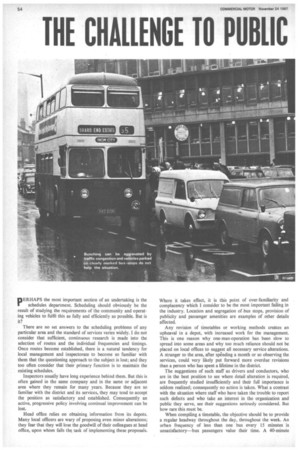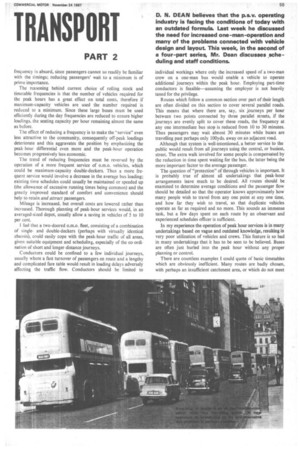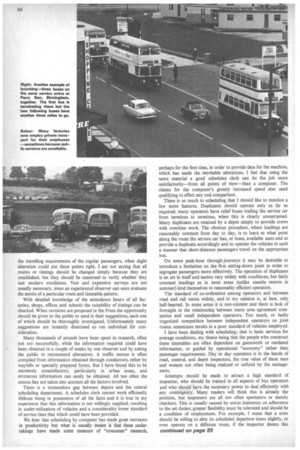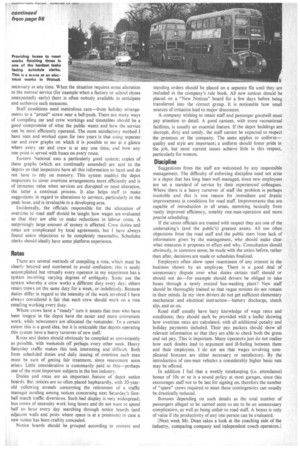THE CHALLENGE TO PUBLIC TRANSPORT
Page 56

Page 57

Page 58

Page 61

If you've noticed an error in this article please click here to report it so we can fix it.
PERHAPS the most important section of an undertaking is the schedules department. Scheduling should obviously be the result of studying the requirements of the community and operating vehicles to fulfil this as fully and efficiently as possible. But is it?
There are no set answers to the scheduling problems of any particular area and the standard of services varies widely. I do not consider that sufficient, continuous research is made into the selection of routes and the individual frequencies and timings. Once routes become established, there is a natural tendency for local management and inspectorate to become so familiar with them that the questioning approach to the subject is lost; and they too often consider that their primary function is to maintain the existing schedules.
Inspectors usually have long experience behind them. But this is often gained in the same company and in the same or adjacent area where they remain for many years. Because they are so familiar with the district and its services, they may tend to accept the position as satisfactory and established. Consequently an active, progressive policy involving continual improvement can be lost.
Head office relies on obtaining information from its depots. Many local officers are wary of proposing even minor alterations; they fear that they will lose the goodwill of their colleagues at head office, upon whom falls the task of implementing these proposals.
Where it takes effect, it is this point of over-familiarity and complacency which I consider to be the most important failing in the industry. Location and segregation of .bus stops, provision of publicity and passenger amenities are examples of other details affected.
Any revision of timetables or working methods creates an upheaval in a depot, with increased work for the management. This is one reason why one-man-operation has been slow to spread into some areas and why too much reliance should not be placed on local offices to suggest all necessary service alterations. A stranger to the area, after spending a month or so observing the services, could very likely put forward more overdue revisions than a person who has spent a lifetime in the district.
The suggestions of such staff as drivers and conductors, who are in the best position to see where detail alteration is required, are frequently studied insufficiently and their full importance is seldom realized; consequently no action is taken. What a contrast with the situation where staff who have taken the trouble to report such defects and who take an interest in the organization and public they serve, see their suggestions seriously considered. But how rare this must be.
When compiling a timetable, the objective should be to provide a regular headway throughout the day, throughout the week. An urban frequency of less than one bus every 15 minutes is unsatisfactory—bus passengers value their time. A 40-minute frequency is absurd, since passengers cannot so readily be familiar with the timings; reducing passengers' wait to a minimum is of prime importance.
The reasoning behind current choice of rolling stock and timetable frequencies is that the number of vehicles required for the peak hours has a great effect on total costs, therefore if maximum-capacity vehicles are used the number required is reduced to a minimum. Since these large buses must be used efficiently during the day frequencies are reduced to ensure higher loadings, the seating capacity per hour remaining almost the same as before.
The effect of reducing a frequency is to make the "service" even less attractive to the community, consequently off-peak loadings deteriorate and this aggravates the position by emphasizing the peak-hour differential even more and the peak-hour operation becomes progressively less economic.
The trend of reducing frequencies must be reversed by the operation of a more frequent service of o.m.o. vehicles, which could be maximum-capacity double-deckers. Thus a more frequent service would involve a decrease in the average bus loading; existing time schedules could usually be maintained or speeded up (the allowance of excessive running times being common) and the greatly improved standard of comfort and convenience should help to retain and attract passengers.
Mileage is increased, but overall costs are lowered rather than increased. Thorough planning of peak-hour services would, in an averaged-sized depot, usually allow a saving in vehicles of 5 to 10 per cent.
I feel that a two-doored o.m.o. fleet, consisting of a combination of singleand double-deckers (perhaps with virtually identical chassis), could easily cope with the peak-hour traffic of all areas, given suitable equipment and scheduling, especially of the co-ordination of short and longer-distance journeys.
Conductors could be confined to a few individual journeys, usually where a fast turnover of passengers en route and a lengthy and complicated fare table would result in loading delays adversely affecting the traffic flow. Conductors should be limited to individual workings where only the increased speed of a two-man crew on a one-man bus would enable a vehicle to operate additional journeys within the peak hour. Employing part-time conductors is feasible—assuming the employer is not heavily taxed for the privilege.
Routes which follow a common section over part of their length are often divided on this section to cover several parallel roads. This means that where there are, say, six journeys per hour between two points connected by three parallel streets, if the journeys are evenly split to cover these roads, the frequency at any one intermediate bus stop is reduced from 10 to 30 minutes. Thus passengers may wait almost 30 minutes while buses are travelling past perhaps only 100yds. away on an adjacent road.
Although that system is well-intentioned, a better service to the public would result from all journeys using the central, or busiest, street. The extra walk involved for some people is compensated by the reduction in time spent waiting for the bus, the latter being the more important factor to the average passenger.
The question of "protection" of through vehicles is important. It is probably true of almost all undertakings that peak-hour arrangements leave much to be desired. All routes should be examined to determine average conditions and the passenger flow should be detailed so that the operator knows approximately how many people wish to travel from any one point at any one time, and how far they wish to travel, so that duplicate vehicles operate as far as required and no more. This sounds an immense task, but a few days spent on each route by an observant and experienced schedules officer is sufficient.
In my experience the operation of peak hour services is in many undertakings based on vague and outdated knowledge, resulting in very poor utilization of vehicles and crews. This feature is so bad in many undertakings that it has to be seen to be believed. Buses are often just hurled into the peak hour without any proper planning or control.
There are countless examples I could quote of basic timetables which are obviously inefficient. Many routes are badly chosen, with perhaps an insufficient catchment area, or which do not meet the travelling requirements of the regular passengers, when slight alteration could put these points right. I am not saying that all routes or timings should be changed simply because they are established, but they should be examined to verify whether they suit modern conditions. Vast and expensive surveys are not usually necessary, since an experienced observer can soon evaluate the merits of a particular route and timetable pattern.
With detailed knowledge of the attendance hours of all factories, shops, offices and schools the suitability of timings can be checked. When revisions are proposed in the Press the opportunity should be given to the public to send in their suggestions, each one of which should be thoroughly investigated. Unfortunately many suggestions are instantly dismissed as too individual for consideration.
Many thousands of pounds have been spent in research, often not too successfully, while the information required could have been obtained in a couple of weeks by one observer and by asking the public to recommend alterations. A traffic census is often compiled from information obtained through conductors, either by waybills or specially prepared forms. But I have found this to be extremely unsatisfactory, particularly in urban areas, and erroneous information can easily be obtained. All too often the census has not taken into account all the factors involved.
There is a tremendous gap between depots and the central scheduling department. A schedules clerk cannot work efficiently Without being in possession, of all the facts and it is true in my experience that this information is not willingly supplied, resulting in under-utilization of vehicles and a considerably lower standard of service than that which could have been provided.
We hear that scheduling by computer has made great increases in productivity but what is usually meant is that these under, takings have made some measure of "consumer" research, perhaps for the first time, in order to provide data for the machine, which has made the inevitable alterations. I feel that using the same material a good schedules clerk can do the job more satisfactorily—from all points of view—than a computer. The claims for the computer's greatly increased speed also need qualifying to effect any real comparison.
There is so much to scheduling that I should like to mention a few more features. Duplicates should operate only as far as required; many operators have relief buses trailing the service car from terminus to terminus, when this is clearly unwarranted. Many duplicates are retained by a depot simply to provide crews with overtime work. The obvious procedure, where loadings are reasonably constant from day to day, is to learn at what point along the route the service car has, or loses, available seats and to provide a duplicate accordingly and to operate the vehicles in such a manner that short-distance passengers travel on the appropriate bus.
On some peak-hour through-journeys it may be desirable to introduce a limitation on the first setting-down point in order to segregate passengers more effectively. The operation of duplicates is an art in itself and tactics vary widely with conditions, but fairly constant loadings as in most areas (unlike seaside resorts in summer) lend themselves to reasonably efficient operation.
The standard of co-ordination among operators and between road and rail varies widely, and in my opinion is, at best, only half-hearted. In some areas it is non-existent and there is lack of foresight in the relationship between many area agreement companies and small independent operators. Too much, or badly organized competition between independent operators on joint routes sometimes results in a poor standard of vehicles employed.
I have been dealing with scheduling; that is basic services for average conditions, my theme being that the people who construct these timetables are often dependent on guesswork or outdated information, or guided by operational "economy" rather than passenger requirements. Day to day operation is in the hands of road, control, and depot inspectors, the true value of these men and women not often being realized or utilized by the management.
Attempts should be made to attract a high standard of inspector, who should be trained in all aspects of bus operation and who should have the necessary power to deal efficiently with any contingency. Many readers will think this is already the position, but inspectors are all too often spectators or merely checkers. This is usually caused by union insistence on adherence to the set duties; greater flexibility must be tolerated and should be a condition of employment. For example, I mean that a crew should be willing to alter its scheduled departure times slightly, or even operate on a different route, if the inspector deems this continued on page 59 necessary at any time. When the situation requires some alteration to the normal service (for example when a factory or school closes unexpectedly early) there is often nobody available to anticipate and authorize such measures.
Staff conditions need meticulous care—from holiday arrangements to a "proud" screw near a bell-push. There are many ways of compiling car and crew workings and timetables should be a good compromise of what the public wants and how the service can be most efficiently operated. The most satisfactory method I have •seen and worked upon for two years is that using separate car and crew graphs on which it is possible to see at a glance where every car and crew is at any one time, and how any one point is served with buses on every route.
Eastern National uses a particularly good system; copies of these graphs (Which are continually amended) are sent to the depots so that inspectors have all this information to hand and do not have to rely on memory. This system enables the depot inspectors to cover overtime arrangements more efficiently and is of immense value when services are disrupted or need alteration, the latter a continual process. It also helps staff to make suggestions in regard to alterations to services, particularly in the peak hour, and is invaluable in a developing area.
Incidentally, the officials responsible for the allocation of overtime to road staff should be tanght how wages are evaluated so that they are able to make reductions in labour costs. A surprisingly large amount of money is affected. Crew duties and rotas are complicated by local agreements, but I have always found union objections to be completely reasonable. Schedules clerks should ideally have some platform experience.
Rotas
There are several methods of compiling a rota, which must be clearly lettered and numbered to avoid confusion; this is easily accomplished but virtually every operator in my experience has a system involving varying degrees of ambiguity. Some use the system whereby a crew works a different duty every day: others retain crews on the same duty for a week, or indefinitely. Because duties differ in regard to the intensity of the work involved I have always considered it fair that each crew should work on a rota entailing working every duty.
Where crews have a "steady" turn it means that men who have been longest in the depot have the easier and more convenient work, while newcomers are allocated the remainder. To a certain extent this is a good idea, but it is noticeable that depots operating this system have a heavy turnover of new staff.
Rotas and duties should obviously be compiled as conveniently as possible, with weekends off perhaps every other week. Heavy Saturday traffic makes this task interesting and difficult. Both from scheduled duties and daily issuing of overtime each man must be sure of getting fair treatment, since resentment soon arises. Little consideration is customarily paid to this—perhaps one of the most important subjects in the bus industry_ Duties and rotas are an important feature of depot notice boards. But notices are so often placed haphazardly, with 20-yearold yellowing screeds concerning the retirement of a traffic manager nestling among notices concerning next Saturday's football match traffic diversions. Such bad display is very widespread; bus crews of necessity work long hours and do not want to spend half an hour every day searching through notice boards (and adjacent walls and posts where space is at a premium) in case a new notice has been craftily concealed.
Notice boards should be grouped according to content and standing orders should be placed on a separate file until they are included in the company's rule book. All new notices should be placed on a "New Notices" board for a few days before being transferred into the correct group. It is noticeable how small sources of irritation lead to major discontent.
A company wishing to retain staff and passenger goodwill must pay attention to detail. A good canteen, with some recreational facilities, is usually an essential feature. If the depot buildings are decrepit, dirty and untidy, the staff cannot be expected to respect the premises or the company. The same applies to uniform— quality and style are important; a uniform should foster pride in the job, but most current issues achieve little in this respect, particularly for women.
Discipline
Suggestions from the staff are welcomed by any responsible management. The difficulty of enforcing discipline need not arise in a depot that has long been well managed, since new employees are set a standard of service by their experienced colleagues. Where there is a heavy turnover of staff the problem is perhaps insoluble and this is one reason for immediate and drastic improvements in conditions for road staff. Improvements that are capable of introduction in all areas, stemming basically from vastly improved efficiency, notably one-man-operation and more precise scheduling.
If the union officials are treated with respect they are one of the undertaking's (and the public's) greatest assets. All too often objections from the road staff and the public stem from lack of information given by the management, who should make clear what measures it proposes to effect and why. Consultation should obviously, in common sense, be made with the union before, rather than after, decisions are made or schedules finalized.
Employers often show open resentment of any interest in the business shown by an employee. There is a good deal of unnecessary dispute over what duties certain staff should or should not do—for example should drivers be obliged to take buses through a newly erected bus-washing plant? New staff should be thoroughly trained so that vague notions do not remain in their minds. In my view drivers do not get sufficient elementary mechanical and electrical instruction—battery discharge, clutch slip, and so on.
Road staff usually have hazy knowledge of wage rates and conditions; they should each be provided with a leaflet showing how overtime rates are calculated, with all additional penalty and holiday payments included. Their pay packets should show all relevant information so that they are able to check both the gross and net pay. This is important. Many operators just do not realize how such doubts lead to argument and ill-feeling between them and their employees. I do not see that wages involving complicated bonuses are either necessary or satisfactory. By the introduction of one-man vehicles a considerably higher basic rate may be offered.
In addition I feel that a weekly timekeeping (i.e. attendance) bonus of lOs or.so is a sound policy at most garages, since this encourages staff not to be late for signing on, therefore the number of "spare" crews required to meet these contingencies can usually be drastically reduced.
Bonuses depending on such details as the total number of passengers alleged to be carried seem to me to be an unnecessary complication, as well as being unfair to road staff. A bonus is only of value if the productivity of any one person can be evaluated.
[Next week Mr. Dean takes a look at the coaching side of the industry, comparing company and independent coach operators.]












































































































































